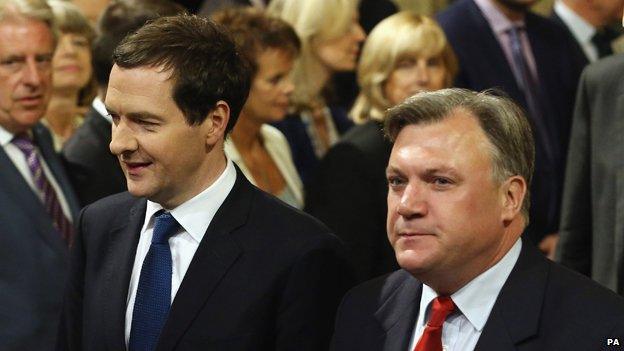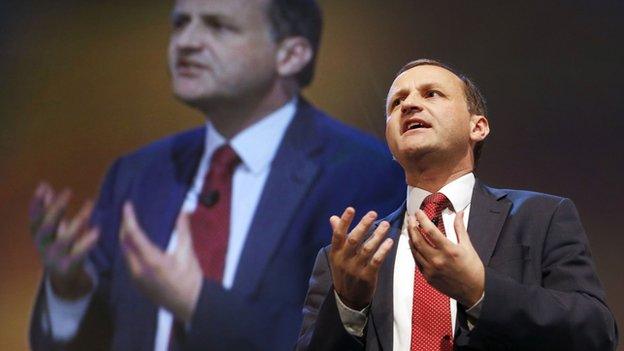Why have Osborne and Balls neutered themselves?
- Published
- comments

Over the years I have spoken to more chancellors and shadow chancellors than most people of my age (that is not a boast, just a sad fact about my preoccupations).
And typically they say it is a very bad idea to rule out changes to tax rates when making manifesto commitments prior to a general election.
Their point has been that it is impossible to know when the global or indeed domestic economy will go into some kind of spasm that would see a chancellor boshed on the noggin with a wet fish, that would see tax revenues suddenly undermined. And in those circumstances, it is best to retain the ability to boost taxes in whatever way seems appropriate.
However, whichever of Tory or Labour is in power after 7 May, the new government's chancellor will have his or her (surely got to be possible) hands bound and tied when it comes to fiscal matters.
Because both parties have now ruled out increasing the basic and 40% rates of income tax, the rate of National Insurance and the rate of Value Added Tax.
Between them these taxes raise more than £380bn a year, or 60% of all tax revenues.
Also, it is now more or less impossible for political and economic reasons to push up corporation tax rates or business rates (big companies can move abroad, small companies are our future).
So that is another 15% of tax revenues that can't really be augmented to any significant degree.
To put it another way, Ed Balls for Labour and George Osborne for the Tories have done something early-ish in the election campaign which is pretty unusual and Treasury traditionalists would describe as bonkers.
They have promised, in effect, not to increase the burden of the UK's most important income and indirect taxes, that raise 75% of all taxes.
This carries a number of important implications.
One is that to balance the books, to reduce the gap between taxes and spending from the current £90bn a year, the overwhelming burden must be taken by public service and welfare cuts.
The Tories are explicit that's what they wish to do. Labour is a bit more equivocal.
Secondly, if a new government felt there did have to be tax rises, there are really only two options that would raise significant sums. One is the imposition of as yet unspecified new wealth taxes, above and beyond Labour's mansion tax.
Another is to call time on the tax deductibility of pension contributions, or at least create a new streamlined rate of deductibility for all taxpayers (as the Liberal Democrat minister Steve Webb has proposed), which would not be so odd in the context of all the new freedoms the government has given savers to cash in their pension pots.
For what it's worth, the consensus among Treasury officials is that pensions and other forms of wealth will be where any new taxes will be plonked.

Lib Dem minister Steve Webb has proposed new tax rules for pensions
But the point is that neither of these reforms would be quick or easy.
And the fact is that if there were a big shock to the economy, it is difficult to see how either a Labour or Tory chancellor could now fill the big hole that would be created in a hurry - without, that is, breaking one of the important pledges they have made in recent days not to raise VAT, NI or the main income tax rates.
Given that not so long ago that we experienced such a shock, just maybe these pledges not to raise taxes aren't quite as compelling as they seem. Maybe we should ask for the small print of the force majeure clause.
PS It is of course true that Labour has said it would increase the very top rate of income tax from 45% to 50% for the top 1% of earners - those earning more than £150,000 a year. But it is moot whether this will in the long term raise a few billion or just a few hundred million pounds a year, because this group are so skilled at legally avoiding taxes.
Which is partly why, for those who believe the rich should make a bigger contribution and who are concerned about the gap between rich and poor, the debate is about how to impose levies on wealth, in that wealth is harder to hide or disguise than income.